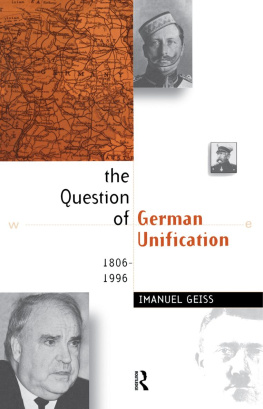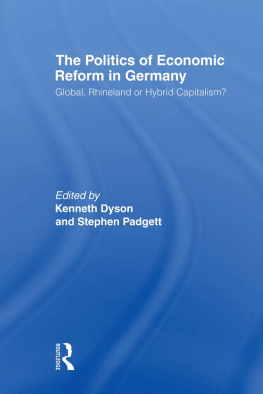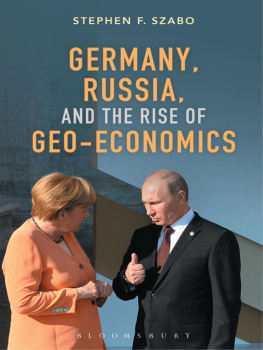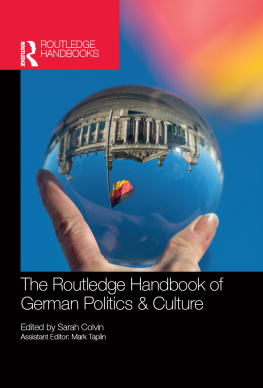THE SEVEN SECRETS OF GERMANY
The Seven Secrets of Germany
ECONOMIC RESILIENCE IN AN ERA OF GLOBAL TURBULENCE
David B. Audretsch
and Erik E. Lehmann


Oxford University Press is a department of the University of Oxford. It furthers the Universitys objective of excellence in research, scholarship, and education by publishing worldwide. Oxford is a registered trade mark of Oxford University Press in the UK and in certain other countries
Published in the United States of America by Oxford University Press 198 Madison Avenue, New York, NY 10016, United States of America
Oxford University Press 2016
All rights reserved. No part of this publication may be reproduced, stored in a retrieval system, or transmitted, in any form or by any means, without the prior permission in writing of Oxford University Press, or as expressly permitted by law, by license, or under terms agreed with the appropriate reproduction rights organization. Inquiries concerning reproduction outside the scope of the above should be sent to the Rights Department, Oxford University Press, at the address above.
You must not circulate this work in any other form and you must impose this same condition on any acquirer
Cataloging-in-Publication Data is on file at the Library of Congress
9780190258719
987654321
Printed in the United States of America on acid-free paper
This book is dedicated to our children Hannah, Christopher, James, and Alexander
Contents
WHEN WE MET up in Jena in November 2003, Germany was at the depths of economic stagnation, worrisome unemployment, growing self-doubt, and angst that was on the verge of entering its second decade. Ever since the euphoria triggered by the fall of the Berlin Wall on November 9, 1989, and the subsequent reunification on October 3, 1990, economic growth had stalled, leading Germans on both sides of the once-divided country to wonder what exactly they had accomplished. In the west, resentment of the Solidarittszuschlag, or solidarity tax, grew. In the east, Ostologie, or a new nostalgia for the quality of life under the stable and predictable communist regime, resonated, especially with the older generation.
Our mandate came from Professor Dr. Peter Gruss, who as president of the Max Planck Society tasked us with creating and directing the newly established Division on Entrepreneurship, Growth and Public Policy of the Max Planck Institute of Economics, which was located in Jena. When colleagues asked why we did not come up with a German title for our new division, the answer was as striking as it was disturbing. There was no word for entrepreneurship in German. The closest concept, Unternehmertum, typically refers to a high-level manager of a company.
In a country that did not seem to have a place for entrepreneurs, where would we ever find talented, but also highly trained and motivated, scholars to embark on a research agenda identifying how Germany and other countries could best ignite the creative and innovative spirit of entrepreneurship? Staring at the corridor of empty offices that cold, dark November day, it was hard to imagine that such young scholars might actually exist.
But find them we did. Thanks to the generosity and professionalism of the Max Planck Society and its stellar world-class reputation in both the natural sciences and the social sciences, they found us. The three-hour train ride from Berlin or Frankfurt did not deter an inspired and determined group of young scholars from joining us from destinations as diverse and heterogeneous as China, Japan, Italy, Spain, Germany, Sweden, the United States, India, the Netherlands, Canada, Australia, Colombia, and Portugal. These young scholars spanning a broad spectrum of scholarly and national backgrounds descended upon Jena and coalesced to tackle not only what exactly influences the extent of entrepreneurship and innovation, but also how exactly those twin forces could best be harnessed to promote society in general and Wohlstand, or economic prosperity, in particular.
We are of course grateful to all of these young scholars for all that we learned from their intellectual endeavors as well as from their inspiration, spirit, and optimism. Some of the most important ideas contained in this book have their origins in the long and heated discussions and debates with our young colleagues back in Jena.
Jena was not the beginning of our work leading to this book. David came to Berlin in 1985, where he served first as research fellow and later as acting director and research professor until 1997 at the Wissenschaftszentrum Berlin fr Sozialforschung (Social Science Research Center Berlin). This provided an extraordinary opportunity to observe and even participate in Germanys transition from a country divided by the Berlin Wall and Cold War, to a reunified and autonomous country, and finally to a leading economic engine of Europe in the context of a globalized economy.
While we met during this time, we did not begin working together until Erik spent a year at the Institute of Development Strategies at Indiana University in 2002 to complete his habilitation. Our growing research collaboration gained momentum as we assumed the director and assistant director positions of the Max Planck Institute of Economics in 2003 and continued even as Erik accepted the appointment as professor of business economics at the University of Augsburg in 2005. In fact, the work of our research team at the Max Planck Institute of Economics led to the discovery that Germany was rapidly becoming an entrepreneurially driven economy, which was documented and explained in our book with our friend and colleague Max Keilbach, Entrepreneurship and Economic Growth, published by Oxford University Press in 2006.
Our research identifying what seemed to be working and not working in Germany extended beyond Davids departure from the Max Planck Institute of Economics in 2009, and increasingly pointed to a number of key elements that, when taken together, seemed to provide Germany with an economic resilience in an era of global turbulence. The purpose of this book is to share what we and our colleagues at the Max Planck Institute of Economics learned about the high degree of economic resilience exhibited by Germany and why and how this might be insightful and instructive for other countries and contexts.
We would like to express our gratitude to a number of colleagues who have contributed to this book, either directly or indirectly. First and foremost, we would like to express our deep thanks to our colleagues at the Max Planck Institute of Economics as well as the broader community of scholars who participated and devoted their ideas, inspiration, energy and efforts to taking a fresh perspective on what factors and forces influence the Wohlstand of a country or place. We are grateful to the careful and meticulous help and support of Chemain Nanney, Aileen Richardson, and Sara Cockerham of the Institute of Development Strategies at Indiana University and Cornelia Noglinski of the Department of Business and Economics at Augsburg University at virtually every stage of this manuscript. Their effort and contributions to this book are invaluable and greatly appreciated. We would also like to thank several owners and managers from traditional Mittelstand companies for their valuable inputs, in particular Alexander Starnecker, Manfred Starnecker and David R. Eisenbeiss.
Finally, we are particularly grateful to Scott Parris, who is the executive editor of economics and finance at Oxford University Press and Cathryn Vaulman, who serves as his assistant editor, for their determined support of this book. We very much appreciate their enthusiasm, encouragement, and commitment to high-quality scholarship and publications, along with their care, effort, and wisdom in guiding the writing process from inception to initial drafts and finally to publication.
Next page












